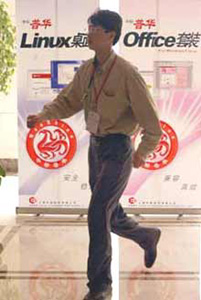
China has never intended to develop an isolated Asian standard for Linux, which some Japanese industry executives fear, said a senior Chinese Government official last week.
"We have never promoted a so-called 'Asian standard' in Linux development," Ding Wenwu, director of the Ministry of Information Industry (MII)'s electronics and information products management department, said last week.
The Chinese, Japanese and South Korean governments last September formed an strategic alliance to promote Linux development and applications in Asia.
Linux, an open-source code software programme, is widely considered safer and cheaper than Microsoft's Windows and Unix operating systems (OSs) which are based on proprietary programming.
Japan is concerned that China's development of a unified Asian standard of Linux failed to take global practices into consideration, the website of Japanese media Nikkei Business Publications Inc (NikkeiBP) last week quoted Etsuhiko Shoyama, deputy director of the Japan OSS (open source software) Promotion Forum, as saying.
NikkeiBP's report said China has already prepared a 200-page scheme for the Linux standard, based on which the three countries are expected to offer "the Asian version of desktop Linux."
However, Ding said he has "never heard of" such a scheme.
"Various versions of Linux will be produced without Japan's involvement," warned Shoyama, late last month during the 2nd Northeast Asia OSS Promotion Forum.
Shoyama is also Hitachi's director of board.
To avoid such consequences, Japan will try to persuade China against independent development before a standard-making group comes into being, said the report.
Some Chinese technicians have accepted Japan's suggestion, but more efforts are needed to reach an agreement between China and Japan, it said.
"Indeed, China has insisted on setting up a working team to draft Linux standards. But the team is under preparation and the relevant development has not even started," said Ding.
Chen Chong, director of China's OSS Promoting Forum, was unavailable for comment.
Chris Zhao, deputy president of Red Flag Software, said the Chinese Government has been encouraging international cooperation in standard-making, and is unlikely to draft a Linux standard only applicable within a region.
Red Flag is China's largest Linux developer.
"Asianux, our product jointly developed with Oracle, is a typical example," he said.
"We followed relevant national standards and also referred to international practices when developing the product."
Red Flag and Miracle Linux, a Japan-based subsidiary of Oracle, the world's largest enterprise software maker, have jointly launched Asianux, a version of Linux developed for the Asian market in June.
Asianux is now proving to be very successful as many vendors are willing to accept it, said Zhao. More than 40 vendors have planned to get certification for Asianux, including hardware makers AMD, Dell, Hewlett-Packard, NEC and Chinese leading server maker Langchao and anti-virus software makers TrendMicro and Sophos, according to media reports.
Zhao also described Asianux as "the first achievement that the Linux alliance has made."
And he said that "we want Asianux to be recognized globally if no unified international standard is available."
However, Asianux, is embarrassingly positioned, the product is not recognized, either technically or officially.
"We have no contact with Oracle, and we know little about Asianux," said Ding.
Meanwhile, Yuan Meng, the director-designate of the China office of Opening Source Development Lab (OSDL), said that "OSDL declines to recognize Asianux."
OSDL is a non-profit organization that offers technology for Linux development.
OSDL currently has two offices worldwide, in the United States and Japan. The China office is expected to be opened soon.
"Red Flag adopts a similar approach in Linux development as Red Hat does that the source code is not really opened," said Yuan, who was formerly Red Flag's chief engineer.
US-based Red Hat Inc is a world leader in open source code software development.
Linux users are supposed to get a copy of the source code in the software package, which Red Flag does not offer, he explained.
Moreover, Red Flag has had no exchange of views with OSDL, the major international organization for Linux development, for technical requirements, said Yuan.
OSDL has already unveiled embedded Linux for communication and desktop Linux for enterprise users, he added.
And Yuan said he was doubtful that many IT firms will promote Asianux in practice.
"At least South Korean firms have not taken part in the Asianux development," he said.
Zhao was quoted by Chinese IT news website www.zdnet.com as saying that Red Flag is expected to have a South Korean distributor for Asianux within two months.
But Oracle's company officials were not available for comment.
(China Daily August 10, 2004)
|

